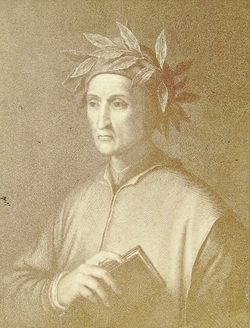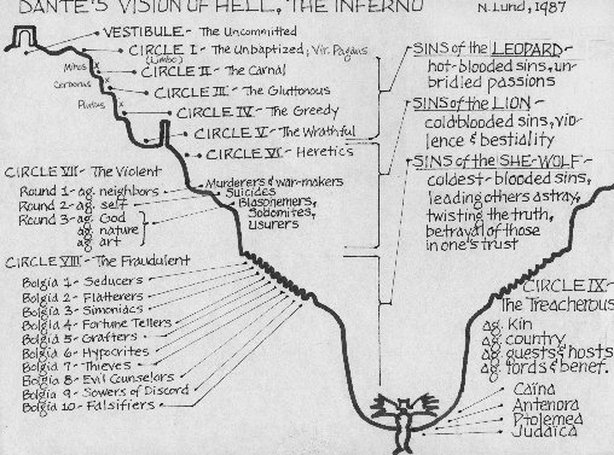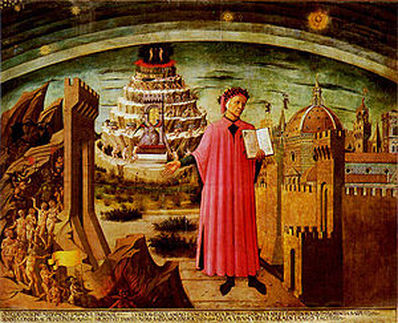Dante Alighieri

Dante was born in 1265 in Florence. He was born into a family with a complex involvement in Florentine politics. At the age of nine, Dante meet Beatrice Portinari, who became his muse. Dante said it was love at first sight, but unfortunately at the age of twelve, it was arrange he would marry Gemma Donati, the daughter of a family friend. In 1285, Dante married Gemma, but he did not love her; he was in love with Beatrice. Sadly in 1890, Beatrice died, but she would live on and play a significant role in Dante’s work.
Five years after Beatrice’s death, Dante published his first book, The Vita Nuova (know as The New Life in English). Vita Nuova accounts his tragic love for Beatrice. The Vita Nuova was very notable at the time because it was the fist book to be written in verse and it was also written in Italian instead of Latin. Along with writing his book, Dante also became involved in politics after Beatrice’s death. He gained two posts in the government. However in 1302, the Black Guelfs seized power of Florence and exiled Dante for being on the White Guelfs side. He exile was to be for two years, but his exile was later extended to the rest of his life. Though Dante had been driven out of his home, but this would be the start of his most productive period.
During his exile, Dante lived throughout Italy while writing. He also conceived the idea of The Divine Comedy during the first years of his exile, but would not start working on it for several more years. He also wrote other books during his exile. While living in Bologna in 1304, he began to write De Vulgari Eloquentia (also known as The Eloquent Vernacular). In his book he urged that refined Italian, only used occasionally for writing, be improved with aspects of every spoken dialect in order to make Italian a serious literary language. Though he only completed two of the intended four books were completed, De Vulgari Eloquentia was influential because it helped unite the territories of Italy. He also wrote Convivio between 1304 and 1307. Convivio is a philosophical essay that personifies philosophy as a gentle woman and explains that Dante fell in love with philosophy after Beatrice died. He wrote the Convivio in order to defend his reputation, which had dropped after his exile, and to show his cultural value. Convivio was never completed and only four of fifteen books were completed. The work was never finished because Dante stopped working on it to start The Divine Comedy. Though Concivio was never completed, Dante used many philosophical and political ideas in later works, especially The Divine Comedy. He took a break from writing The Divine Comedy and wrote the Monarchia. The Monarchia, written in Latin, is about monarchy. In the three books of Monarchia, he claims that the authority of the emperor is not dependent on the pope but descends upon him directly from God. Dante expressed that he believed the best form of government is a universal monarchy/ universal empire. The Monarchia expressed political ideas that would later be used in The Divine Comedy.
The Divine Comedy is Dante’s masterpiece. After writing for twelve years, Dante completed what he called Commedia in 1317 (the title Divine was add on after his death). Commedia is made up of three books, Inferno, Purgatory, and Paradise. His work describes a pilgrim’s journey through hell, purgatory, and heaven. He describes each “world” to show what afterlife is like, and to encourage everyone to live better lives on Earth.
The pilgrim is Dante’s alter ego and he is taken on this trip at the request of Beatrice, his true love. Virgil guides Dante through Hell and Purgatory because Beatrice lives in Heaven and is not permitted to go down. Dante died in 1321, shortly after the completion of Comedia, but lives on to this day through his works.
Dante was a very important figure in the Renaissance. He was alive before the Renaissance even started but had the thinking of a Renaissance man. The Divine Comedy was the first great work of literature and the first work with a personal interpretation since the fall of Rome. He is the first person to write a great work of literature for the people in their language. He wrote in a vernacular that we know today and Modern Italian. Since he was the first to write a great work of literature in Italian, he is considered the father of Italian since other writers followed in his steps and started to write in the language of the people. His work, The Divine Comedy, is still considered one of the three most important works of literature ever, because it showed civilization reemerged. It also marked the end of the Middle Ages and rule by the Catholic Church. Finally he is important because his work formed the bridge between the Middle Ages and the Renaissance. Though the subject matter of The Divine Comedy was still very religious like the Middle Ages, it was very creative, rebellious, and contained mythology, which was non-Catholic. All of those factors are all views of the Renaissance, which helped people push forward out of the Middle Ages.
Five years after Beatrice’s death, Dante published his first book, The Vita Nuova (know as The New Life in English). Vita Nuova accounts his tragic love for Beatrice. The Vita Nuova was very notable at the time because it was the fist book to be written in verse and it was also written in Italian instead of Latin. Along with writing his book, Dante also became involved in politics after Beatrice’s death. He gained two posts in the government. However in 1302, the Black Guelfs seized power of Florence and exiled Dante for being on the White Guelfs side. He exile was to be for two years, but his exile was later extended to the rest of his life. Though Dante had been driven out of his home, but this would be the start of his most productive period.
During his exile, Dante lived throughout Italy while writing. He also conceived the idea of The Divine Comedy during the first years of his exile, but would not start working on it for several more years. He also wrote other books during his exile. While living in Bologna in 1304, he began to write De Vulgari Eloquentia (also known as The Eloquent Vernacular). In his book he urged that refined Italian, only used occasionally for writing, be improved with aspects of every spoken dialect in order to make Italian a serious literary language. Though he only completed two of the intended four books were completed, De Vulgari Eloquentia was influential because it helped unite the territories of Italy. He also wrote Convivio between 1304 and 1307. Convivio is a philosophical essay that personifies philosophy as a gentle woman and explains that Dante fell in love with philosophy after Beatrice died. He wrote the Convivio in order to defend his reputation, which had dropped after his exile, and to show his cultural value. Convivio was never completed and only four of fifteen books were completed. The work was never finished because Dante stopped working on it to start The Divine Comedy. Though Concivio was never completed, Dante used many philosophical and political ideas in later works, especially The Divine Comedy. He took a break from writing The Divine Comedy and wrote the Monarchia. The Monarchia, written in Latin, is about monarchy. In the three books of Monarchia, he claims that the authority of the emperor is not dependent on the pope but descends upon him directly from God. Dante expressed that he believed the best form of government is a universal monarchy/ universal empire. The Monarchia expressed political ideas that would later be used in The Divine Comedy.
The Divine Comedy is Dante’s masterpiece. After writing for twelve years, Dante completed what he called Commedia in 1317 (the title Divine was add on after his death). Commedia is made up of three books, Inferno, Purgatory, and Paradise. His work describes a pilgrim’s journey through hell, purgatory, and heaven. He describes each “world” to show what afterlife is like, and to encourage everyone to live better lives on Earth.
The pilgrim is Dante’s alter ego and he is taken on this trip at the request of Beatrice, his true love. Virgil guides Dante through Hell and Purgatory because Beatrice lives in Heaven and is not permitted to go down. Dante died in 1321, shortly after the completion of Comedia, but lives on to this day through his works.
Dante was a very important figure in the Renaissance. He was alive before the Renaissance even started but had the thinking of a Renaissance man. The Divine Comedy was the first great work of literature and the first work with a personal interpretation since the fall of Rome. He is the first person to write a great work of literature for the people in their language. He wrote in a vernacular that we know today and Modern Italian. Since he was the first to write a great work of literature in Italian, he is considered the father of Italian since other writers followed in his steps and started to write in the language of the people. His work, The Divine Comedy, is still considered one of the three most important works of literature ever, because it showed civilization reemerged. It also marked the end of the Middle Ages and rule by the Catholic Church. Finally he is important because his work formed the bridge between the Middle Ages and the Renaissance. Though the subject matter of The Divine Comedy was still very religious like the Middle Ages, it was very creative, rebellious, and contained mythology, which was non-Catholic. All of those factors are all views of the Renaissance, which helped people push forward out of the Middle Ages.
Dante's Inferno

Dantes Inferno.

